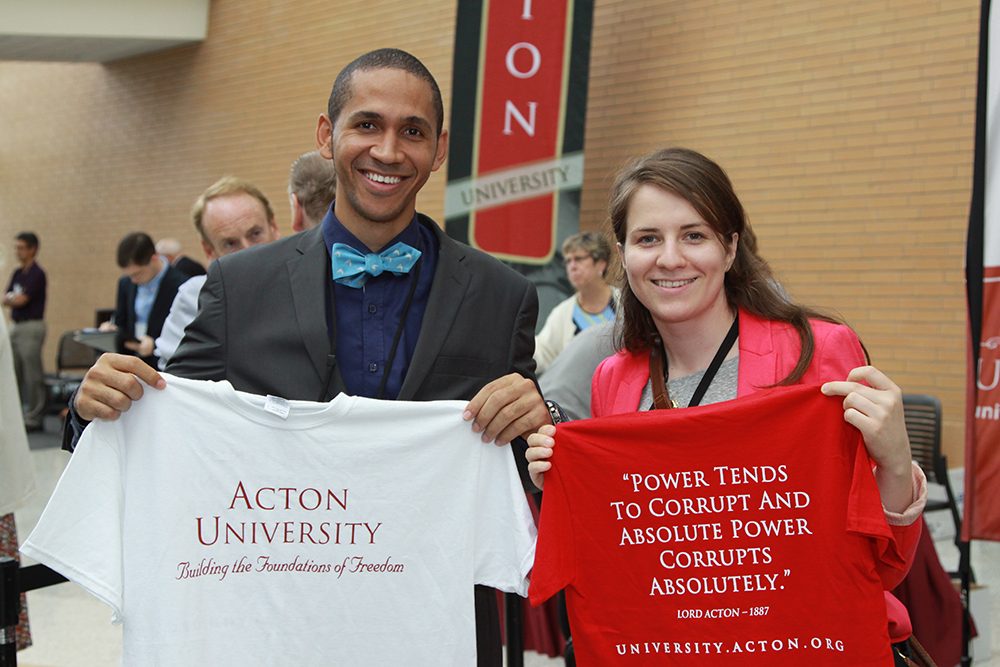I have confession to make: I don’t like conferences.
I don’t like seminars or conventions, either. I also don’t like colloquiums, symposiums, forums, or summits. I love people (really, I do) and I love discussions about ideas. But something happens when you put them together into a “conference” that causes my introverted tendencies to spike. I’m just not a conference-going kinda guy.
That’s probably an odd admission to make, especially in a post in which I try to convince you to come to Acton University. But it puts my praise for AU in perspective. Even though I don’t like most conferences I still have to go to several every year. All of the ones I attend are excellent, engaging, and fruitful—but they aren’t the sort of thing you’d go to if you aren’t a fan of conferences. AU is different. It’s the only conference-type event I can unreservedly recommend to people who don’t like conferences. Here are five reasons why:
1. The foundational courses are excellent — The first time you attend AU you’re required to take four foundation courses (Biblical Foundations of Freedom, Christian Anthropology, Christian Vision of Government, and Economic Way of Thinking). Initially, I thought that was overly intrusive. Why try to tell me what I have to sign up for? But after taking the classes I realize how helpful it is to have everyone in attendance in possession of the same basic facts and understanding about what it means to build a free and virtuous society.
2. The classes are amazing — The problem with most conferences is that the most of the action takes place on the main stage. It’s like a sporting event—it’s often more enjoyable to watch it on video from the comfort of your own couch. The breakout sessions are usually filler and the quality varies considerably. At AU, the plenary sessions are the main course. The classes are comprised of small groups led by instructors who are experts on their topics. You don’t just get a rousing speech, you get real engagement with a topic you’re interested in. These courses alone are worth the price of admission.
3. The pacing is near perfect — Many people may find (as I did) that it’s not so much conferences that they don’t like, it’s the pacing. That is one of the single most important things AU does differently—and better—than almost any other event. Too often, conferences attempt to cram in too many sessions in too short a time. Conference planners for such events have the best intentions, of course. They want you to feel like you’re getting your money’s worth. But the result is that you’re usually rushing around and don’t get time to engage with the other people in attendance. You won’t get that feeling at AU. There is just enough time between sessions that you can engage in fellowship without feeling rushed and yet not so much downtime that you feel antsy or bored.
4. The spacing is near perfect too — Along with pacing, an important element of an event is the space. Many conferences have large crowds crammed into small venues or spread out over a massive complex. The result is that you either feel claustrophobic or worn out from the extended hike to each session. AU is always at the DeVos Place Convention Center, a superb location that feels just right—not too big, not too small.
5. The people are fascinating — At most events I attend every year, the attendees look a lot like me (i.e., white, male, middle-age, Protestant). Of course, there’s nothing wrong with white, male, middle-age Southern Baptists (I’m rather fond of them myself). But it does limit the type of connections I make and the reason for attending a conference. At most events I meet people I could have met online or at some other, similar conferences. At AU, the range of demographic groups represented is amazing, especially for such a relatively small conference (around 800 people). Sure, you’ll find a lot of the standard conference type folks (e.g. people who look like me). But you’ll also find a range of religious backgrounds and vocations (Orthodox priests, Catholic nuns, Presbyterian entrepreneurs, et al.), a mix of men and women, old and young, and people from all over the world. What’s most exciting, though, is that they are all people united around a Christian vision of human flourishing. You’ll meet people who are genuinely enthusiastic about learning about the classical foundations of freedom and how they apply to our culture today.
AU is still 40 days away, so you have plenty of time to think about attending. Give it some thought and get some more information. AU isn’t for everybody. But you may be surprised—as I was—to find out it is for you.

